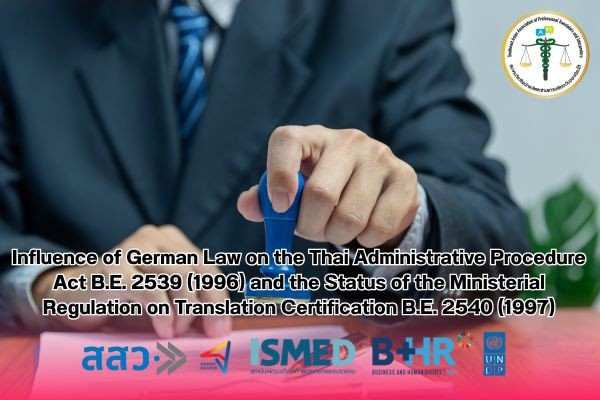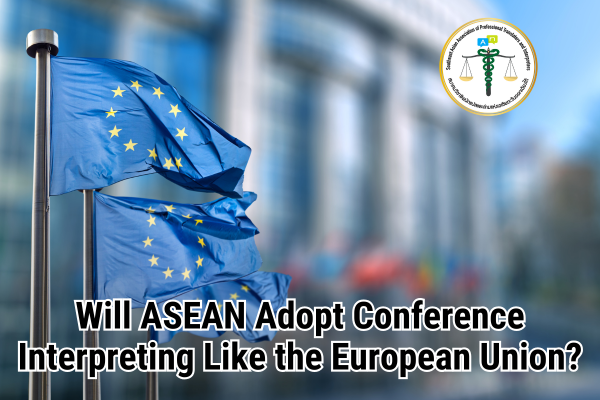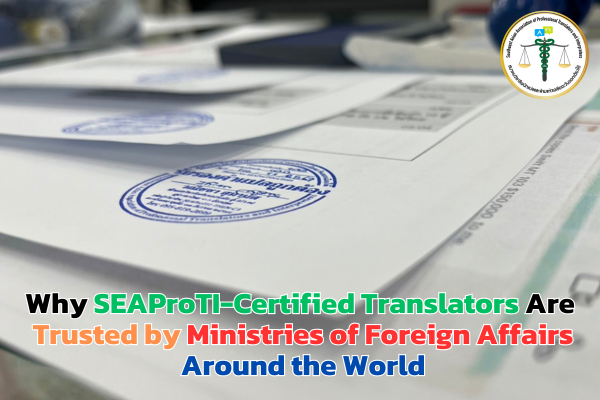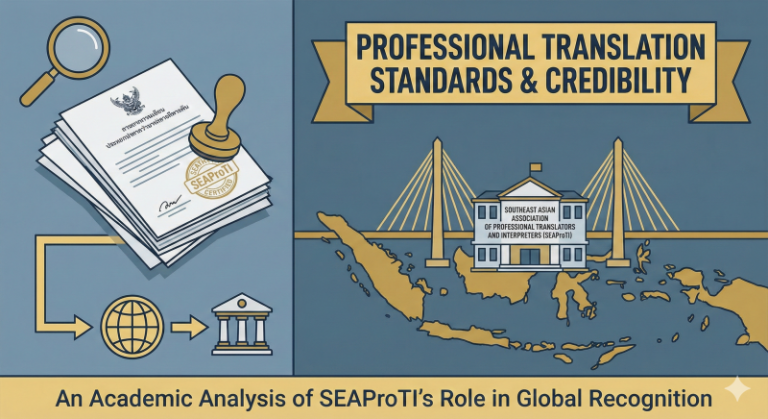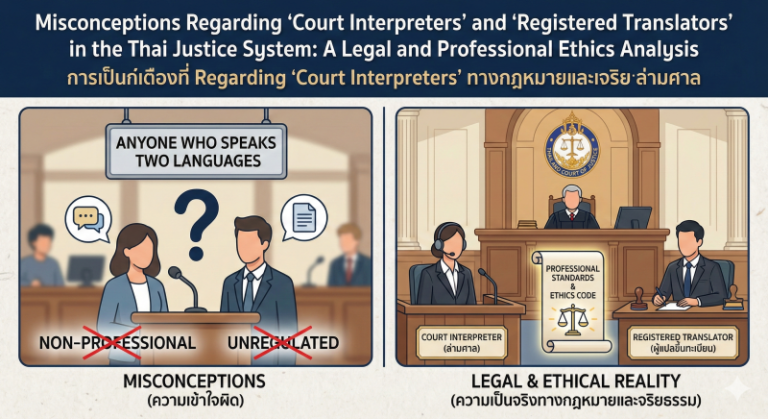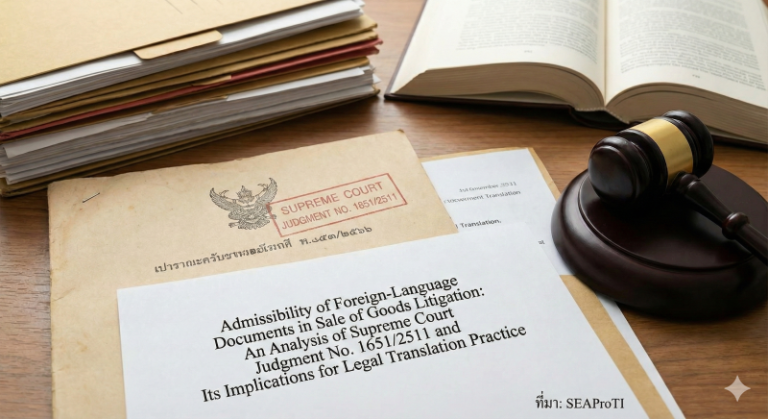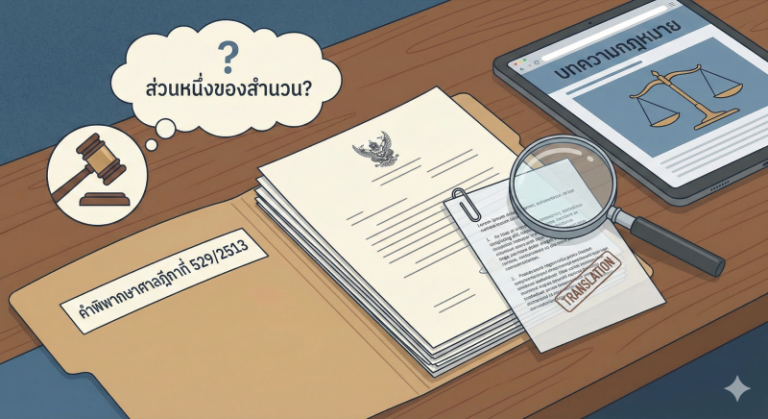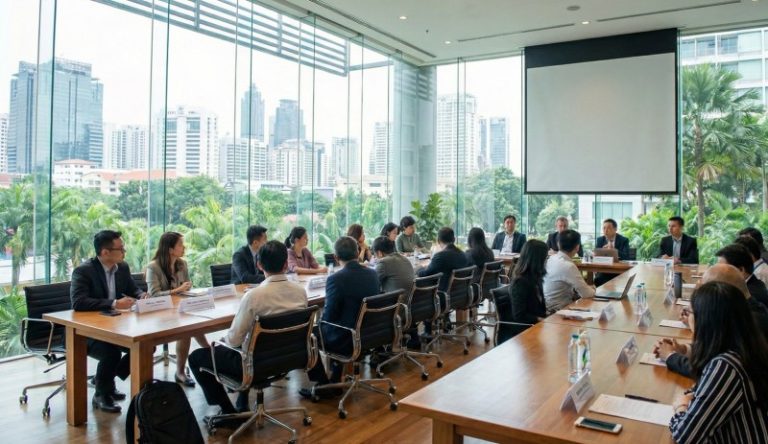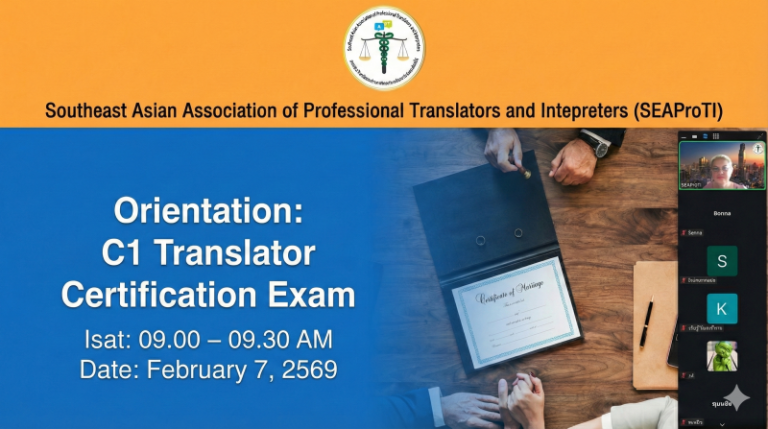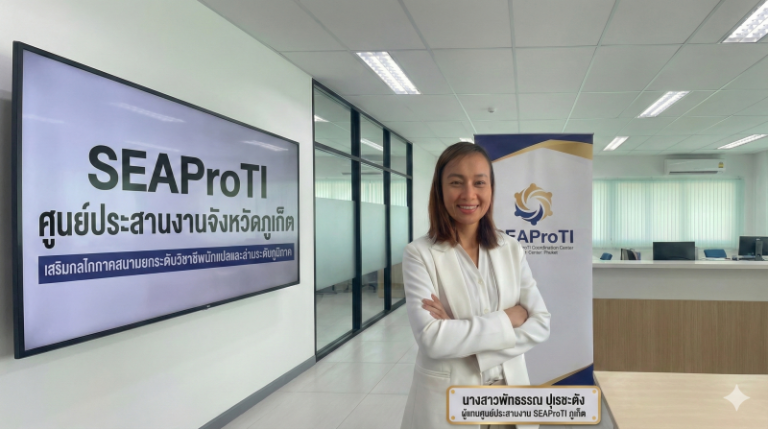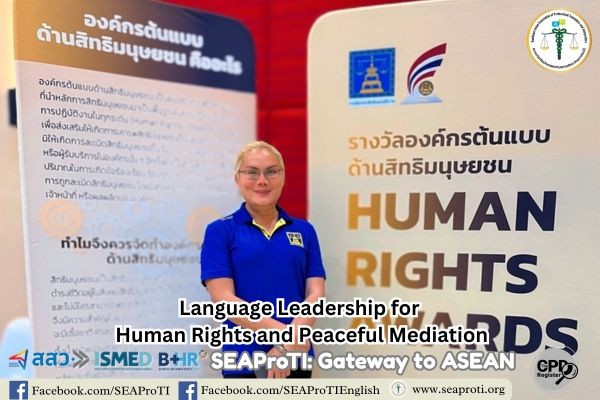The Influence of German Law on the Thai Administrative Procedure Act B.E. 2539 (1996) and the Status of the Ministerial Regulation on Translation Certification B.E. 2540 (1997)
3 September 2025, Bangkok – The Administrative Procedure Act B.E. 2539 (1996) is a landmark public law in Thailand that reformed the country’s administrative mechanisms, ensuring greater transparency and recognizing citizens’ rights to participate in administrative processes. Academic studies clearly indicate that the Act was significantly influenced by the German Administrative Procedure Act (Verwaltungsverfahrensgesetz: VwVfG 1976). However, this was not a verbatim adoption; instead, Thailand adapted its core principles and structure to fit the Thai legal system.
German Legal Influence
The structure of the Thai Act is notably similar to Germany’s VwVfG, particularly in the following aspects:
1. Fair Administrative Procedure, emphasizing the protection of citizens’ rights.
2. Right to Be Heard, guaranteeing public participation in administrative processes.
3. Duty to State Reasons, which is central to checks and balances on administrative authority.
Although these principles were influenced by Germany, the drafting of the Act was carried out by Thai public law scholars and the Council of State’s legislative committee, with adaptations made to suit Thai social and legal contexts (Prasit, 2001; Udomsak, 2005).
Status of the Ministerial Regulation on Translation Certification B.E. 2540 (1997)
This Regulation was issued pursuant to Section 26, paragraph two, of the 1996 Act and published in the Royal Thai Government Gazette in May 1997. It prescribes categories of individuals authorized to certify translations, including:
1. Thai nationals with degrees in foreign languages
2. University lecturers in foreign language studies
3. Foreign embassies or consulates in Thailand
4. Thai embassies or consulates abroad
The Regulation demonstrates the independent development of Thailand’s secondary legislation, framed within German-influenced administrative thought but entirely drafted by Thai legislators.
Application and Scholarly Observations
Academic studies suggest that while German models provide a structural basis, their direct application in Thailand requires careful adaptation due to distinct administrative and cultural contexts (Taweekiat, 1999; Worachet, 2012). Thus, although rooted in German procedural concepts, the 1997 Regulation stands as a uniquely Thai legal product.
Conclusion
The Administrative Procedure Act B.E. 2539 (1996) was significantly influenced in both concept and structure by the German Verwaltungsverfahrensgesetz (1976). However, the Ministerial Regulation on Translation Certification B.E. 2540 (1997) represents secondary legislation drafted and promulgated entirely by Thailand under the authority of the Act. Hence, while the Act is a hybrid product inspired by German law, the Regulation is a distinctly Thai creation.
References
- Prasit, P. (2001). Administrative Procedure Law: Principles and Applications. Bangkok: Winyuchon.
- Taweekiat, M. (1999). Principles of Administrative Law. Bangkok: Thammasat University Press.
- Worachet, P. (2012). Thai Public Law: Development and Comparative Concepts. Bangkok: Winyuchon.
- Udomsak, N. (2005). Lawful Administration: A Comparative Study of Thailand and Germany. Journal of Public Law, 12(2), 45–72.
- Verwaltungsverfahrensgesetz (VwVfG) [Federal Administrative Procedures Act], Federal Republic of Germany, 1976.
About Certified Translators, Translation Certification Providers, and Certified Interpreters of SEAProTI
The Southeast Asian Association of Professional Translators and Interpreters (SEAProTI) has announced the criteria and qualifications for registration of Certified Translators, Translation Certification Providers, and Certified Interpreters of the Association. These criteria were published under Sections 9 and 10 of the Royal Thai Government Gazette, Secretariat of the Cabinet, Office of the Prime Minister, on 25 July 2024, Vol. 141, Part 66 Ng, p. 100. Full text available here: The Royal Thai Government Gazette
** The Office of the Council of State has proposed issuing a Royal Decree stipulating that registered translators—including certification providers from professional associations or accredited language training institutions be legally empowered to certify translations (Letter to SEAProTI dated 28 April 2025).
*** SEAProTI is the first professional association in Thailand and Southeast Asia to establish a formal certification system for Certified Translators, Translation Certification Providers, and Certified Interpreters.
Headquarters: 33 Baan Rajakhru Building, Room 402, Soi Phahonyothin 5, Phahonyothin Road, Phayathai Sub-district, Phayathai District, Bangkok 10400, Thailand
Email: hello@seaproti.com Phone: (+66) 2-114-3128 (Office Hours: Monday–Friday, 09:00–17:00)
อิทธิพลของกฎหมายเยอรมันต่อพระราชบัญญัติวิธีปฏิบัติราชการทางปกครอง พ.ศ. 2539 และสถานะของกฎกระทรวงผู้รับรองการแปล พ.ศ. 2540
3 กันยายน 2568, กรุงเทพมหานคร – พระราชบัญญัติวิธีปฏิบัติราชการทางปกครอง พ.ศ. 2539 ถือเป็นกฎหมายมหาชนสำคัญที่ปรับปรุงกลไกการบริหารงานปกครองของไทยให้เป็นระบบ มีความโปร่งใส และรับรองสิทธิของประชาชนในการมีส่วนร่วมในกระบวนการทางปกครอง การศึกษาทางวิชาการระบุชัดว่ากฎหมายฉบับนี้ ได้รับอิทธิพลอย่างมีนัยสำคัญจากกฎหมายวิธีปฏิบัติราชการทางปกครองของเยอรมนี (Verwaltungsverfahrensgesetz: VwVfG 1976) โดยมิใช่การคัดลอกถ้อยคำโดยตรง หากแต่เป็นการนำแนวคิดหลักและโครงสร้างมากำหนดให้สอดคล้องกับระบบกฎหมายไทย
อิทธิพลของกฎหมายเยอรมัน
โครงสร้างของ พ.ร.บ. 2539 มีความคล้ายคลึงกับ VwVfG ของเยอรมนี โดยเฉพาะในด้าน
1. หลักความเป็นธรรมทางปกครอง (Fair Administrative Procedure) ที่เน้นการคุ้มครองสิทธิของประชาชน
2. สิทธิในการรับฟังและโต้แย้ง (Right to be Heard) ซึ่งสร้างหลักประกันให้ประชาชนได้มีส่วนร่วม
3. การให้เหตุผลในคำสั่งทางปกครอง (Duty to State Reasons) ที่เป็นหัวใจในการตรวจสอบถ่วงดุลอำนาจฝ่ายปกครอง
แม้มีอิทธิพลจากเยอรมนี แต่ การร่างกฎหมายเป็นผลงานของนักกฎหมายมหาชนไทย และคณะกรรมการร่างกฎหมายของสำนักคณะกรรมการกฤษฎีกา โดยมีการประยุกต์ใช้ให้เหมาะสมกับบริบทสังคมและกฎหมายไทย (ประสิทธิ์, 2544; อุดมศักดิ์, 2548)
สถานะของกฎกระทรวงผู้รับรองการแปล พ.ศ. 2540
กฎกระทรวงฉบับนี้ออกตาม มาตรา 26 วรรคสอง พ.ร.บ. วิธีปฏิบัติราชการทางปกครอง พ.ศ. 2539 และประกาศใน ราชกิจจานุเบกษา เมื่อเดือนพฤษภาคม 2540 เนื้อหากำหนดประเภทของผู้ที่มีอำนาจรับรองการแปล เช่น
- คนไทยผู้สำเร็จการศึกษาสาขาภาษาต่างประเทศ
- อาจารย์ในสถาบันอุดมศึกษา
- สถานทูตหรือสถานกงสุลต่างประเทศ
- สถานทูตหรือสถานกงสุลไทยในต่างประเทศ
กฎกระทรวงดังกล่าวสะท้อนถึง การพัฒนากฎหมายลูกของไทยเอง ที่อยู่ภายใต้กรอบแนวคิดซึ่งรับอิทธิพลจากเยอรมนี แต่ตัวบททั้งหมดเป็นงานร่างของฝ่ายนิติบัญญัติไทย
การประยุกต์ใช้และข้อสังเกตเชิงวิชาการ
งานศึกษาทางวิชาการชี้ว่า แม้จะมีการรับแบบแผนจากเยอรมนี แต่การนำมาใช้กับระบบราชการไทยต้องอาศัยการปรับตัวและข้อยกเว้นบางประการ เพราะบริบทการปกครองของไทยมีลักษณะเฉพาะ (ทวีเกียรติ, 2542; วรเจตน์, 2555) ดังนั้นกฎกระทรวงปี 2540 แม้จะมีพื้นฐานทางความคิดจากเยอรมนี แต่ถือเป็น ผลผลิตของกฎหมายไทย โดยแท้
บทสรุป
พระราชบัญญัติวิธีปฏิบัติราชการทางปกครอง พ.ศ. 2539 ได้รับอิทธิพลเชิงแนวคิดและโครงสร้างจากกฎหมายเยอรมนี (VwVfG 1976) อย่างมีนัยสำคัญ แต่ กฎกระทรวงผู้รับรองการแปล พ.ศ. 2540 เป็นกฎหมายลำดับรองที่ ฝ่ายไทยร่างและประกาศใช้เอง ภายใต้กรอบอำนาจของ พ.ร.บ. ดังกล่าว ดังนั้นสามารถกล่าวได้ว่า พ.ร.บ. เป็นผลผลิตเชิงประยุกต์จากแบบอย่างเยอรมนี ส่วนกฎกระทรวงเป็นผลงานกฎหมายไทยโดยสมบูรณ์
เอกสารอ้างอิง (References)
- ประสิทธิ์ ปิวาวัฒน์. (2544). กฎหมายวิธีปฏิบัติราชการทางปกครอง: หลักการและการประยุกต์ใช้. กรุงเทพฯ: วิญญูชน.
- ทวีเกียรติ มีนะกนิษฐ. (2542). หลักกฎหมายปกครอง. กรุงเทพฯ: สำนักพิมพ์มหาวิทยาลัยธรรมศาสตร์.
- วรเจตน์ ภาคีรัตน์. (2555). กฎหมายมหาชนไทย: พัฒนาการและแนวคิดเปรียบเทียบ. กรุงเทพฯ: วิญญูชน.
- อุดมศักดิ์ นิติกุล. (2548). การปกครองโดยชอบด้วยกฎหมาย: ศึกษาเปรียบเทียบไทย–เยอรมนี. วารสารกฎหมายมหาชน, 12(2), 45–72.
- Verwaltungsverfahrensgesetz (VwVfG) [Federal Administrative Procedures Act], Bundesrepublik Deutschland, 1976.
เกี่ยวกับนักแปลรับรอง ผู้รับรองการแปล และล่ามรับรองของสมาคมวิชาชีพนักแปลและล่ามแห่งเอเชียตะวันออกเฉียงใต้
* สมาคมวิชาชีพนักแปลและล่ามแห่งเอเชียตะวันออกเฉียงใต้ (SEAProTI) ได้ประกาศหลักเกณฑ์และคุณสมบัติผู้ที่ขึ้นทะเบียนเป็น “นักแปลรับรอง (Certified Translators) และผู้รับรองการแปล (Translation Certification Providers) และล่ามรับรอง (Certified Interpreters)” ของสมาคม หมวดที่ 9 และหมวดที่ 10 ในราชกิจจานุเบกษา ของสำนักเลขาธิการคณะรัฐมนตรี ในสำนักนายกรัฐมนตรี แห่งราชอาณาจักรไทย ลงวันที่ 25 ก.ค. 2567 เล่มที่ 141 ตอนที่ 66 ง หน้า 100 อ่านฉบับเต็มได้ที่: นักแปลรับรอง ผู้รับรองการแปล และล่ามรับรอง
** สำนักคณะกรรมการกฤษฎีกาเสนอให้ตราเป็นพระราชกฤษฎีกา โดยกำหนดให้นักแปลที่ขึ้นทะเบียน รวมถึงผู้รับรองการแปลจากสมาคมวิชาชีพหรือสถาบันสอนภาษาที่มีการอบรมและขึ้นทะเบียน สามารถรับรองคำแปลได้ (จดหมายถึงสมาคม SEAProTI ลงวันที่ 28 เม.ย. 2568)
*** สมาคมวิชาชีพนักแปลและล่ามแห่งเอเชียตะวันออกเฉียงใต้ เป็นสมาคมวิชาชีพแห่งแรกในประเทศไทยและภูมิภาคเอเชียตะวันออกเฉียงใต้ที่มีระบบรับรองนักแปลรับรอง ผู้รับรองการแปล และล่ามรับรอง
สำนักงานใหญ่: อาคารบ้านราชครู เลขที่ 33 ห้อง 402 ซอยพหลโยธิน 5 ถนนพหลโยธิน แขวงพญาไท เขตพญาไท กรุงเทพมหานคร 10400 ประเทศไทย
อีเมล: hello@seaproti.com โทรศัพท์: (+66) 2-114-3128 (เวลาทำการ: วันจันทร์–วันศุกร์ เวลา 09.00–17.00 น.)


